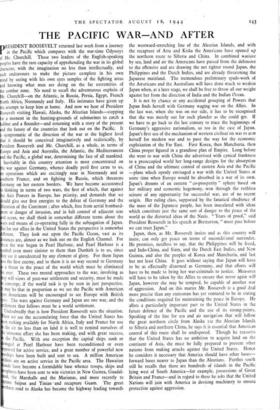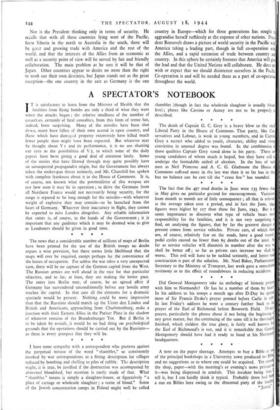THE PACIFIC WAR AND AFTER
DRESIDENT ROOSEVELT returned last week from a journey Jr in the Pacific which compares with the war-time Odysseys of Mr. Churchill. These two leaders of the English-speaking peoples have the rare capacity of apprehending the war in its global aracter, with the imagination no less than intellectually, and ach endeavours to make the picture complete in his own ind by seeing with his own eyes samples of the fighting areas nd knowing what men are doing on the far extremities of e combat zone. No need to recall the adventurous exploits of . Churchill—on the Atlantic, in Russia, Persia, Egypt, French orth Africa, Normandy and Italy. His intimates have given up e attempt to keep him at home. And now we hear of President osevelt visiting Hawaii, Alaska, the Aleutian Islands—stopping or a moment in the hunting-grounds of submarines to catch a libut and a flounder—and returning with a story of the present nd the future of the countries that look out on the Pacific. It symptomatic of the direction of the war at the highest level at it should be conceived imaginatively and realistically, by resident Roosevelt and Mr. Churchill, as a whole, in terms of urope and Asia and Australia, the Atlantic, the Mediterranean nd the Pacific, a global war, determining the fate of all mankind. Inevitably in this country attention is most concentrated on e war against Germany, whence deadly peril first came to us, n operations which are excitingly near in Normandy and in uthern France, and on fighting in Russia, which threatens ermany on her eastern borders. We have become accustomed thinking in terms of two wars, the first of which, that against e Axis Powers in Europe, has priority, and demands that we ould give our first energies to the defeat of Germany and the beration of the Continent ; after which, free from aerial bombard- ent or danger of invasion, and in full control of adjacent seas d ocean, we shall think in somewhat different terms about the ys and means of co-operating fully in the subjugation of Japan. ut for our allies in the United States the perspective is somewhat ifferent. They look out upon the Pacific Ocean, vast as its istances are, almost as we look out on the English Channel. For em the war began in Pearl Harbour, and Pearl Harbour is a mhol even more sinister to them than Dunkirk is to us, since ey see it unredeemed by any element of glory. For them Japan as the first enemy, and to them it is no way second to Germany a threat to the peace of the world which must be eliminated r ever. These two mental approaches to the war, involving as ey will views of post-war settlement and security, must be made converge, if the world task is to be seen in just perspective. may be that in proportion as we see the Pacific with American es Americans will be encouraged to see Europe with British es. The wars against Germany and Japan are one war, and the ttlement that follows must be a world settlement.
Undoubtedly that is how President Roosevelt sees the situation. en we see the accumulating force -that the United States has en making available for North Africa, Italy and France for use the air no less than on land it is well to remind ourselves of e immense effort she has been making, and with great success, the Pacific. With one exception the capital ships sunk or waged at Pearl Harbour have been reconditioned or even proved for active service, and a great number of powerful new rships have been built and sent to sea. A million American Idlers are on active service in the Pacific area. The Hawaiian nds have become a formidable base whence troops, ships and roplanes have been sent to win victories in New Guinea, Guadal- al, the Marshals and the Marianas, and more recently to Pture Saipan and Tinian 'and recapture Guam. The great, rthern road to Alaska has become the highway leading towards the westward-stretching line of the Aleutian Islands, and with the recapture of Attu and Kiska the Americans have opened up the northern route to Siberia and China. In combined warfare by sea, land and air the Americans have passed from the defehsive to the offensive and are drawing the net tighter round Japan, the Philippines and the Dutch Indies, and are already threatening the Japanese mainland. The tremendous preliminary spade-work of the Americans and the Australians will have done much to weaken Japan when, at a later stage, we shall be free to throw all our weight against her from the direction of India and the Indian Ocean.
It is not by chance or any accidental grouping of Powers that Japan finds herself with Germany waging war on the Allies. In the last war, when she was on our side, it has to be recognised that she was merely out for such plunder as she could get. If we have to go back to the last century to trace the beginnings of Germany's aggressive nationalism, so too in the case of Japan. Japan's first use of the mechanism of western civilisaf on was to arm herself for modern war and to pave the way for the economic exploitation of the Far East. First Korea, then Manchuria, then China proper figured in a grandiose plan of Empire. Long before she went to war with China she advertised with cynical frankness to a preoccupied world her long-range designs for the absorption of China and the ultimate control of eastern Asia and the Pacific —plans which openly envisaged a war with the United States at some time when Europe would be absorbed in a war of its own. Japan's dreams of an eastern " co-prosperity " sphere based on her military and economic hegemony,. won through the ruthless seizure of any opportunity for successful war, are of no recent origin. Her ruling class, supported by the fanatical obedience of the mass of the Japanese people, has been inoculated with ideas which constitute just the same sort of danger to the peace of the world as the distorted ideas of the Nazis. " Years of proof," said President Roosevelt in his speech at Bremerton, " must pass before we can trust Japan."
Japan, then, as Mr. Roosevelt insists and as this country will insist, can only get peace on terms of unconditional surrender. He promises, needless to say, that the Philippines will be freed, and Indo-China, and Siam, and the Dutch East Indies, and New Guinea, and also the peoples of Korea and Manchuria, and last but not least China. It goes without saying that Japan will have to be as effectually disarmed as Germany, and that efforts will have to be made to bring her war-criminals to justice. Measures will have to be taken by the Allies to ensure that never again will Japan, however she may be tempted, be capable of another war of aggression. And on this matter Mr. Roosevelt is a good deal more precise than any statesman has yet ventured to be in stating the conditions required for maintaining the peace in Europe. He allots a particularly important part to the United States in the future defence of the Pacific and the use of its strong-points. Speaking of the line for sea and air navigation that will follow the great northern circle from Alaska via the Aleutian Islands to Siberia and northern China, he says it is essential that American control of this route shall be undisputed. Though he reasserts that the United States has no ambition to acquire land on the continent of Asia, she must be fully prepared to prevent other nations from making attacks against the United States. Hence he considers it necessary that America should have other bases— forward bases nearer to Japan than the Aleutians. Further south still he recalls that there are hundreds of islands in the Pacific lying west of South America—for example, possessions of Great Britain and France—and in regard to these he asks that the United Nations will join with America in devising machinery to ensure protection against aggression. Nor is the President thinking only in terms of security. He recalls that with all those countries lying west of the Pacific, from Siberia in the north to Australia in the south, there will be great and growing trade with America and the rest of the world, and that the interests of the Allies from an economic as well as a security point of view will be served by fair and friendly collaboration. The main problem as he sees it will be that of Japan. Other countries appear to desire no more than the right to work out their own destinies, but Japan stands out as the great exception—the one country in the east as Germany is the one country in Europe—which for three generations has sought aggrandise herself ruthlessly at the expense of other nations. Pm:- dent Roosevelt draws a picture of world security in the Pacific with America taking a leading part, though in full co-operation with the Allies, and a rapid extension of trade between country an country. In this sphere he certainly foresees that America will girt the lead and that the United Nations will collaborate. He does not wish or expect that we should disinterest ourselves in the Pacific, Co-operation is and will be needed there as a part of co-operation throughout the world.























 Previous page
Previous page